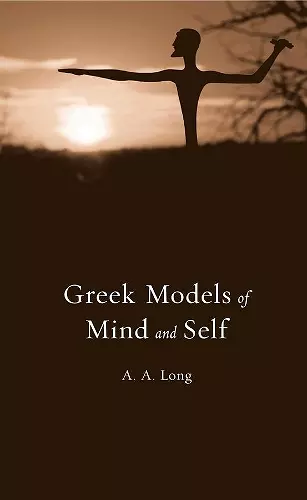Greek Models of Mind and Self
Format:Hardback
Publisher:Harvard University Press
Published:5th Jan '15
Currently unavailable, and unfortunately no date known when it will be back

This lively book offers a wide-ranging study of Greek notions of mind and human selfhood from Homer through Plotinus. A. A. Long anchors his discussion in questions of recurrent and universal interest. What happens to us when we die? How is the mind or soul related to the body? Are we responsible for our own happiness? Can we achieve autonomy? Long asks when and how these questions emerged in ancient Greece, and shows that Greek thinkers’ modeling of the mind gave us metaphors that we still live by, such as the rule of reason or enslavement to passion. He also interrogates the less familiar Greek notion of the intellect’s divinity, and asks what that might mean for us.
Because Plato’s dialogues articulate these themes more sharply and influentially than works by any other Greek thinker, Plato receives the most sustained treatment in this account. But at the same time, Long asks whether Plato’s explanation of the mind and human behavior is more convincing for modern readers than that contained in the older Homeric poems. Turning to later ancient philosophy, especially Stoicism, Long concludes with an exploration of Epictetus’s injunction to live life by making correct use of one’s mental impressions.
An authoritative treatment of Greek modes of self-understanding, Greek Models of Mind and Self demonstrates how ancient thinkers grappled with what is closest to us and yet still most mysterious—our own essence as singular human selves—and how the study of Greek thought can enlarge and enrich our experience.
Where did the notion of the mind or self as a separate entity come from? A. A. Long’s splendid book, Greek Models of Mind and Self, suggests that to answer such questions one could return not to Descartes or the Christian tradition, long regarded as the Western origins of the modern self, but instead to antiquity, where are to be found not only sources for modern ideas, but also alternative ways of imagining ourselves as conscious physical beings. -- Emily Wilson * The Nation *
This diminutive book is a treasure… Bearing the nimble authority won from an extended and productive career, Long unfurls…a carefully stitched series of observations and discussions about the history of theorizing the human being in ancient Greek literature… A masterful tour through classical Greek psychology, conducted with insight and clarity. -- Ellen Muehlberger * Bryn Mawr Classical Review *
Greek Models of Mind and Self makes profound ancient ideas accessible to a general audience. It is a small book, but full of highly stimulating content, and enjoyable to read… Plenty of food for thought, then, for a questioning reader with an interest in psychology or Greek philosophy. -- Lucia Marchini * Minerva *
This book introduces its topic clearly to general readers, while, at the same time, bringing together a lifetime of thought and original research that will be useful to scholars of the subject. It is a small book with a huge range, sound and original in its scholarship. Beginners will read it as an introduction; philosophers of mind ought to read it in order to understand the history of their subject; classical scholars should read it for its insights into authors that might otherwise escape them… In short, this book needs to be widely read. -- Paul Woodruff * Notre Dame Philosophical Reviews *
Long offers here a lucid, engaging narrative of key moments in the Greek attempt to articulate a proper account of what being human means. Long unpacks the literary and conceptual concerns that prompted various formulations of the soul or the human self within distinctive cultural frameworks from Homer to Epictetus… This book by one of the foremost scholars of ancient philosophy covers much ground with admirable clarity and insight. -- A. P. Johnson * Choice *
A. A. Long has written a wonderful book tracing the development of Greek notions of mind and the human self from Homer through the Hellenistic philosophers and Plotinus. In doing so, he offers a superb overview of the issues of greatest interest to the non-specialist in Greek philosophy and psychology, keeping ethical questions at the center. Even the specialist will learn new things from the material, and the chance to see some central themes carried through nearly the entire Greek tradition is deeply illuminating. -- Christopher Bobonich, Stanford University
Greek Models of Mind and Self is an elegant and insightful book, looking at Greco-Roman theories of the human mind with remarkable clarity of style and an approach that is accessible to a wide variety of readers from various backgrounds. Books in this field are legion but typically limit themselves to overtly philosophical authors and frames of reference, and often are detailed and technical. It is a distinctive merit of Long’s book that it begins with Homer, deals deftly with the controversies that still occasionally swirl around the topic of archaic Greek psychology, and then runs the full range of ancient thought down to late antiquity. I can’t think of any other treatment with this historical range and authority. -- Brad Inwood, University of Toronto
ISBN: 9780674729032
Dimensions: unknown
Weight: unknown
248 pages